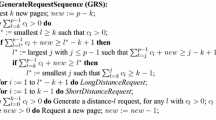Abstract
We introduce the novel concept of knowledge states. The knowledge state approach can be used to construct competitive randomized online algorithms and study the trade-off between competitiveness and memory. Many well-known algorithms can be viewed as knowledge state algorithms. A knowledge state consists of a distribution of states for the algorithm, together with a work function which approximates the conditional obligations of the adversary. When a knowledge state algorithm receives a request, it then calculates one or more “subsequent” knowledge states, together with a probability of transition to each. The algorithm uses randomization to select one of those subsequents to be the new knowledge state. We apply this method to randomized k-paging. The optimal minimum competitiveness of any randomized online algorithm for the k-paging problem is the kth harmonic number, \(H_{k}=\sum^{k}_{i=1}\frac{1}{i}\). Existing algorithms which achieve that optimal competitiveness must keep bookmarks, i.e., memory of the names of pages not in the cache. An H k -competitive randomized algorithm for that problem which uses O(k) bookmarks is presented, settling an open question by Borodin and El-Yaniv. In the special cases where k=2 and k=3, solutions are given using only one and two bookmarks, respectively.
Similar content being viewed by others
References
Achlioptas, D., Chrobak, M., Noga, J.: Competitive analysis of randomized paging algorithms. Theor. Comput. Sci. 234, 203–218 (2000)
Bartal, Y., Chrobak, M., Larmore, L.L.: A randomized algorithm for two servers on the line. In: Proceedings 6th European Symposium on Algorithms (ESA). Lecture Notes in Computer Science, pp. 247–258. Springer, Berlin (1998)
Bartal, Y., Chrobak, M., Larmore, L.L.: A randomized algorithm for two servers on the line. Inf. Comput. 158, 53–69 (2000)
Bein, W., Fleischer, R., Larmore, L.L.: Limited bookmark randomized online algorithms for the paging problem. Inf. Process. Lett. 76, 155–162 (2000)
Bein, W., Larmore, L.L.: Trackless online algorithms for the server problem. Inf. Process. Lett. 74, 73–79 (2000)
Bein, W., Larmore, L.L.: Trackless and limited bookmark algorithms for paging. SIGACT News 35, 40–49 (2004)
Bein, W., Larmore, L.L., Reischuk, R.: Knowledge states for the caching problem in shared memory multiprocessor systems. Int. J. Found. Comput. Sci. 40(1), 167–183 (2009)
Bein, W.W., Iwama, K., Kawahara, J., Larmore, L.L., Oravec, J.A.: A randomized algorithm for two servers in cross polytope spaces. In: Proceedings of 5th Workshop on Approximation and Online Algorithms (WAOA), Eilat, Israel, October 11–12, 2007. Lecture Notes in Computer Science, vol. 4927, pp. 246–259. Springer, Berlin (2008)
Borodin, A., El-Yaniv, R.: Online Computation and Competitive Analysis. Cambridge University Press, Cambridge (1998)
Chrobak, M., Koutsoupias, E., Noga, J.: More on randomized on-line algorithms for caching. Theor. Comput. Sci. 290, 1997–2008 (2003)
Chrobak, M., Larmore, L.L.: The server problem and on-line games. In: DIMACS Series in Discrete Mathematics and Theoretical Computer Science, vol. 7, pp. 11–64 (1992)
Coppersmith, D., Doyle, P.G., Raghavan, P., Snir, M.: Random walks on weighted graphs and applications to online algorithms. In: Proceedings 22nd Symposium on Theory of Computing (STOC), pp. 369–378. ACM, New York (1990)
Fiat, A., Karp, R., Luby, M., McGeoch, L.A., Sleator, D., Young, N.E.: Competitive paging algorithms. J. Algorithms 12, 685–699 (1991)
Koutsoupias, E., Papadimitriou, C.: Beyond competitive analysis. In: Proceedings 35th Symposium on Foundations of Computer Science (FOCS), pp. 394–400. IEEE, New York (1994)
Koutsoupias, E., Papadimitriou, C.: Beyond competitive analysis. SIAM J. Comput. 30, 300–317 (2000)
Schläfli, L.: Theorie der vielfachen Kontinuität. Birkhäuser, Basel (1857)
Author information
Authors and Affiliations
Corresponding author
Additional information
Research of W. Bein supported by NSF grant CCR-0312093.
Research of L.L. Larmore supported by NSF grant CCR-0312093.
Rights and permissions
About this article
Cite this article
Bein, W., Larmore, L.L., Noga, J. et al. Knowledge State Algorithms. Algorithmica 60, 653–678 (2011). https://doi.org/10.1007/s00453-009-9366-4
Received:
Accepted:
Published:
Issue Date:
DOI: https://doi.org/10.1007/s00453-009-9366-4




